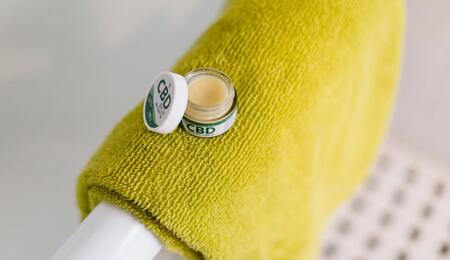CBD for Acne and Healthy Skin

While rarely there's a teenager who's been spared of acne, for some people, acne remains an issue for many years after teenagehood ends. Burning bumps and pimples on the skin are just annoying, irritating, and itching. Cannabidiol (CBD) is one of the natural remedies proven to reduce acne and support healthy skin processes.
Acne is a common skin condition that causes inflamed and painful pimples, pustules, and bumps. Acne occurs when hair follicles become clogged with oil and dead skin cells.
Research has shown that CBD successfully interacts and soothes sebocytes, the cells that produce oily, waxy sebum that leads to acne.
CBD also has proven anti-inflammatory and antioxidant qualities, therefore it can help calm the skin and alleviate inflammation that acne or other skin conditions can cause.
When a person overproduces sebum, they are more likely to have acne. CBD helps cell growth regulation; it targets "problematic" cells only, while healthy cells remain intact and there's rarely side effect such as dry skin or more irritation.
Purer products = better results
For acne, CBD is best used as an oil, cream, or lotion. Products with above 95% pure CBD will have the most effective treatment on the skin. High-grade CBD oils and topicals will also trigger an anti-inflammatory reaction in the cells and help prevent future acne breakouts.
CBD oils and topicals may be helpful for acne, however, the cause and the type of acne are also important to determine the best method that helps against breakouts in skin. Hormonal imbalances, diet, stress, certain medicines, and genetics are all factors associated with acne's appearance, frequency, or severity.
Tannins creams, aloe vera gel, green tea lotions, rosemary lotions, and eucalyptus extracts also work as alternative natural remedies people may find beneficial for acne treatment.
How to use CBD oil as an anti-acne agent?
The application of CBD for acne is simple: mix the CBD oil with a carrier oil and rub directly on the skin. You can use different types of carrier oils, including coconut oil, olive oil, argan, or shea butter, however, you need to find the carrier oil that works best for your skin.
Oral CBD can also help with acne in some cases as cannabidiol interacts with the endocannabinoid system inside the body and helps against inflammation. However, studies exploring CBD's effects on the skin suggest topical application may give better results in skin-directed treatments.
The rise of the CBD topical market means there are also various readily available CBD balms and creams, marketed to help improve the skin, just a few clicks away for online orders. When purchasing a topical, it's always good to check on other ingredients in the product to avoid exposure to any irritants that may negatively affect the skin. The distributor should also disclose lab tests that confirm the product's CBD content and purity.
Some of the best-performing brands in the CBD topical niche for the past 12 months include Penguin, Social, Lazarus Naturals, Vermont Organic Science, Redeem Therapeutics, and RE Botanicals, to name some, all of which are third-party tested and has a certificate of analysis.

Can CBD help treat other skin problems?
Research has found that cannabidiol has tremendous potential in regulating natural skin processes, and clinical trials have seen positive results for several other skin conditions. CBD can help manage sensitive skin, eczema, rosacea, and psoriasis, among others.
Sensitive skin
Thanks to its potent antioxidant and anti-inflammatory factors, CBD can be helpful for those with sensitive skin. Again, you need to look for as pure as possible CBD topical solutions to condition your skin. Creams and balms that contain impurities may only further irritate and worsen the skin.
Eczema
An inflammatory skin condition also known as atopic dermatitis — eczema can be triggered by various irritants and allergens, including soaps, shampoos, detergents, house dust mites, pet fur, etc.
Where common creams for eczema fail, CBD can come in as a natural alternative treatment. Everyone's skin is different and some creams may trigger or worsen symptoms. Side effects may include skin discolorations, stretch marks, acne breakouts, etc. The anti-inflammatory and anti-microbial properties of CBD may offer relief in this case.
Rosacea
This skin condition presents as redness or "flushing" in the face or other affected area, plus small pus-filled bumps. As with eczema above, there's no cure for rosacea; common creams prescribed for it facilitate skin relief and in some cases, a person with rosacea may also need to take antibiotics. CBD creams, oils or oral supplements can be considered an alternative method.
Psoriasis
A skin disease that causes a rapid buildup of skin cells that result in itchy, silvery patches on areas of the body such as the knees, elbows, trunk, or scalp; psoriasis is a chronic, autoimmune condition that goes into remission and can be triggered back when a person is exposed to stress, or an unhealthy diet and lifestyle.
Some of the known methods to help improve psoriasis include topicals, oral medicines and light therapy. Research shows that CBD can also help aid this debilitating condition. CBD topicals can moisturize affected areas, calm redness and burning sensation, and slim down chances of future psoriasis breakouts.
While you can always test how your skin reacts to homemade CBD medicines or ready-made products marketed to improve skin and reduce acne or other skin condition you might have, for breakouts that persist or look serious, always check with a skincare specialist.





